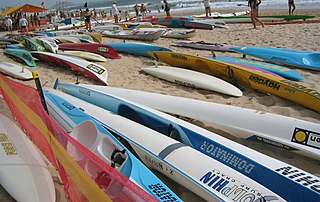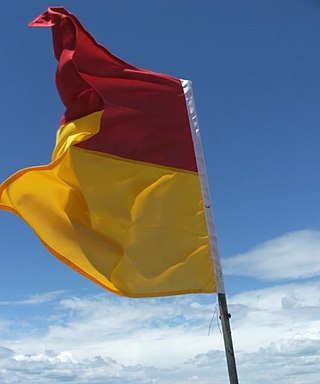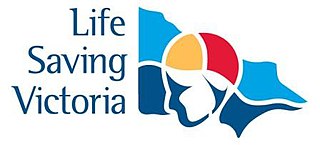
Surf lifesaving is a multifaceted social movement that comprises key aspects of voluntary lifeguard services and competitive surf sport. Originating in early 20th century Australia, the movement has expanded globally to other countries, including New Zealand, Ireland, South Africa, and the United Kingdom. Surf lifesavers in Australia are colloquially known as "Clubbies".

A lifeguard is a rescuer who supervises the safety and rescue of swimmers, surfers, and other water sports participants such as in a swimming pool, water park, beach, spa, river and lake. Lifeguards are trained in swimming and CPR/AED first aid, certified in water rescue using a variety of aids and equipment depending on requirements of their particular venue. In some areas, lifeguards are part of the emergency services system to incidents and in some communities, lifeguards may function as the primary EMS provider.
The Royal Life Saving Society UK is a drowning prevention charity founded in 1891 in the UK. It has had Royal Patronage since 1904.
Surf Life Saving Northern Region is the largest of four regions that make up Surf Life Saving New Zealand. As of the 2021/2022 season, it is made up of 18 clubs that look after 22 patrol locations from Ahipara to Raglan on the West Coast and from Whangārei Heads to Takapuna on the East Coast.

Surf Life Saving New Zealand (SLSNZ) is the national association representing 74 Surf Life Saving Clubs in New Zealand. The organisation's motto is 'In it for Life'. This refers to both the long relationship many members have with the organisation, as well as to the organisation's purpose of preventing drowning and injury, thereby saving lives.

Inflatable Rescue Boats (IRBs) are rubber boats with an outboard motor used in surf lifesaving. IRBs have been used for all forms of surf rescue, retrieval, and service by Surf Lifesaving in New Zealand, Australia, and Del Mar, California since the late 1980s.

Swimming lessons are the process of learning to swim. In most countries there is a definition of a number of swimming levels that are reached in the process of the curriculum. The respective certificates of swimming tests are required for further training in aquatic abilities. Many countries have defined a minimum swimming level that children should reach by the end of primary education, in most cases with the help of school swimming classes being part of the normal curriculum.

The International Life Saving Federation (ILS) is an organisation for drowning prevention, water safety, lifesaving and lifesaving sports.

Surf Life Saving Australia (SLSA) is an Australian not-for-profit community organisation that promotes water safety and provides surf rescue services.

Lifesaving is the act involving rescue, resuscitation and first aid. It often refers to water safety and aquatic rescue; however, it could include ice rescue, flood and river rescue, swimming pool rescue and other emergency medical services. Lifesaving also refers to sport where lifesavers compete based on skills, speed and teamwork. Lifesaving activities specialized in oceanic environment is called surf lifesaving or coastal lifesaving.

National Lifeguard, commonly known as an NL, NLA or NLS, is a lifeguarding certification program in Canada, offered by the Lifesaving Society.

The Bronze Cross is a certification in water rescue that is the mainstay of the lifesaving training offered in Canada, and awarded by the Royal Life Saving Society of Canada. Before one can take the Bronze Cross course, the Bronze Medallion (Canada) is required. With Bronze Cross and Standard First Aid certification, one can be an assistant lifeguard in some provinces. For National Lifeguard Certification or to become an Instructor, a current or expired Bronze Cross and current Standard First Aid certification are required. The Bronze Cross endurance swim requirement is 400 meters in 11 minutes using either front swim, back swim, breast stroke throughout the swim.
The Rashtriya Life Saving Society (India) [RLSSI] is a national, non-profit, voluntary organisation dedicated to helping people to learn modern lifesaving techniques. The Society is the leading provider of training in first aid, resuscitation, water safety, life saving and life guarding skills in India. The Society is a member of the International Life Saving Federation and branch of the Royal Life Saving Society Commonwealth.
National Water Life Saving Association (NWLSA), also known as Chinese Taipei Water Life Saving Association (CTWLSA), is the major lifesaving organization in Taiwan. The organization's members are mainly volunteer lifesavers, police officers, firefighters and civilians who are enthusiastic about water sports, water safety awareness and water rescue events.

Life Saving Victoria is an Australian life saving organisation formed in 2002 from a merger of the Victorian Branch of the Royal Life Saving Society Australia and Surf Life Saving Victoria. Life Saving Victoria works to prevent drownings and other water related deaths and injuries in Victoria. Life Saving Victoria teaches local communities in Victoria about water safety, swimming and resuscitation. It also provides surf life saving services and patrols for beaches across the state. Life Saving Victoria is an emergency support agency to Victoria Police for water based emergencies.
Water safety refers to the procedures, precautions and policies associated with safety in, on, and around bodies of water, where there is a risk of injury or drowning. It has applications in several occupations, sports and recreational activities.
Open Water Wisdom is a community water activity safety program that was spearheaded by The Royal Life Saving Society of Canada and The Canadian Red Cross. It is dedicated to bringing awareness to recreational water safety issues nationally and in hundreds of remote communities across Canada.
Robert "Bob" MacKenzie Burnside was appointed the first president of the Surf Life Saving Association of America in 1964, which later became known as the United States Lifesaving Association. In 1965, he was appointed president of the National Surf Life Saving Association. In 1967, he developed the revolutionary plastic “Burnside Rescue Can”, now a standard for lifeguards worldwide and iconic symbol of beach lifeguarding. He was a champion swimmer who introduced the Malibu balsa surfboard to Australia. He wrote the History of Junior Lifeguarding.

Lifesaving South Africa (LSA) is a South African organisation that promotes water safety and provides surf rescue services. LSA is a founding member organisation of the International Life Saving Federation, and a member of Royal Life Saving Society. It is recognised by DSAC and SASCOC.
Pakistan Life Saving Foundation is a registered Non-Government Organization (NGO) in Pakistan. This internationally accredited NGO was established in 2004 for the purpose of providing life-saving services along the beaches of Karachi (Pakistan). It is the country's only privately run, near-shore drowning prevention and rescue body. It employs around 250 trained lifeguards that belong to the neighboring coastal fishing communities.












